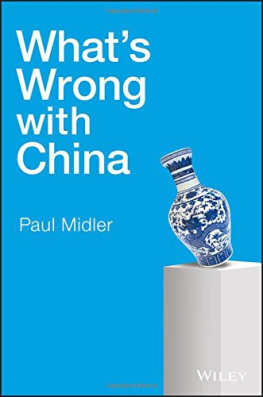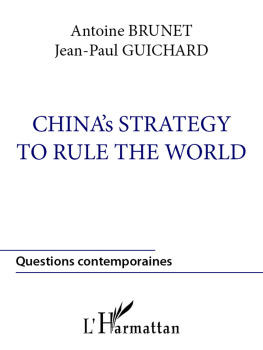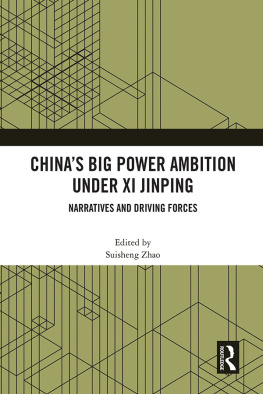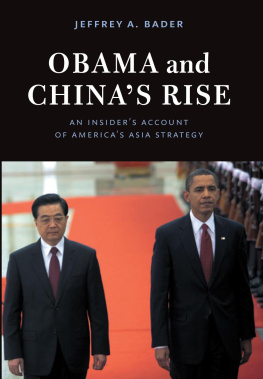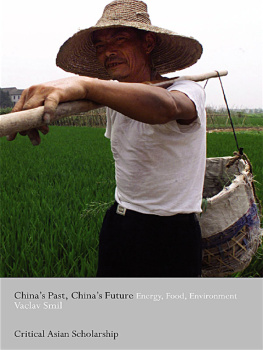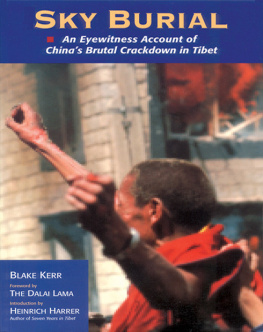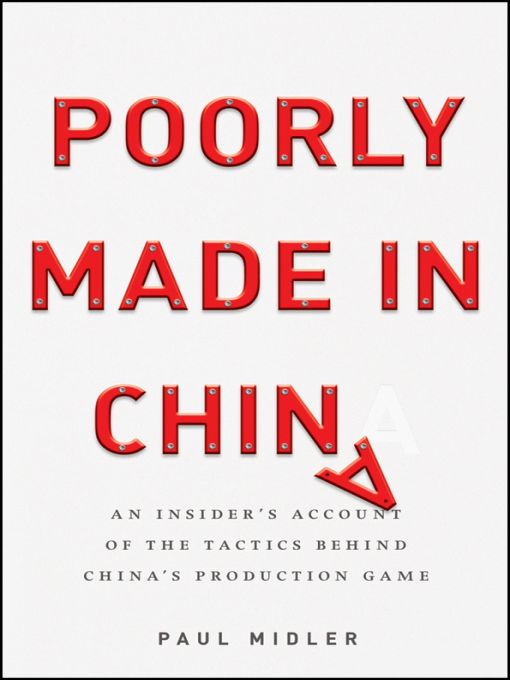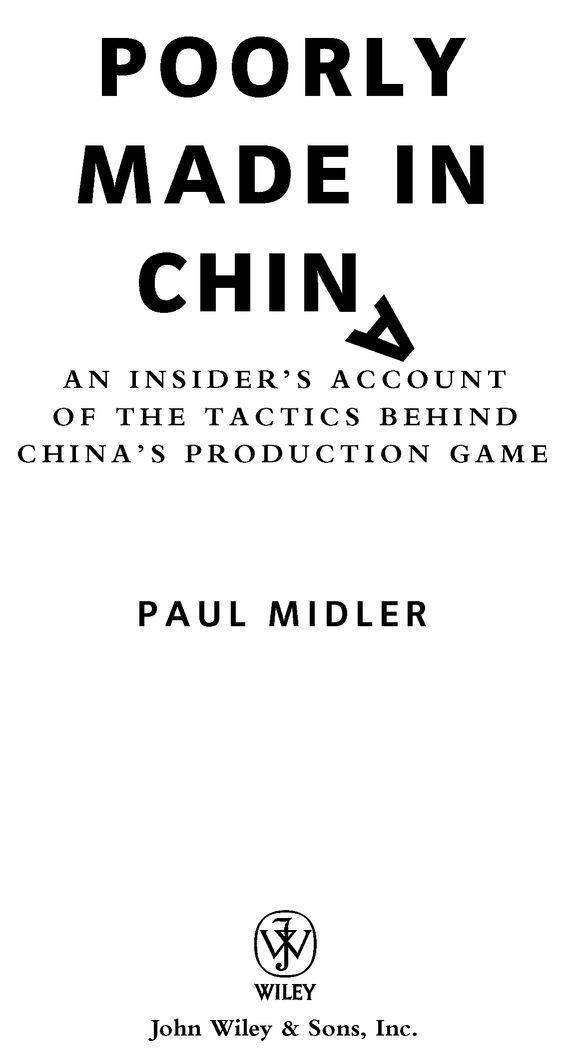Table of Contents
It is better to know some of the questions than all of the answers.
James Thurber
All war is based on deception: When able to attack, we must pretend
to be incapable; When employing forces, we must seem inactive;
When we are near, we must make the enemy believe we are far;
Offer bait to lure him; If he appears humble, make him arrogant; If
he is rested, wear him down; If his forces are united, divide them;
Take action when it is unexpected.
Sunzi (the strategist formerly known as Sun Tzu)
The first condition of right thought is right sensationthe first condition of understanding a foreign country is to smell it.
T. S. Eliot
CHAPTER 1
Vanishing Act
China manufactured everything in the world, and along with it, every imaginable smell. Walking through its many factories, you could catch some of those smells: the heady fumes from adhesives used to make leather shoes, the nutty scents of ceramic vases as they were baked in gas-fired kilns, the sour notes of polypropylene plastics as they melted and were injected at high temperatures. Each manufacturing process was its own olfactory experience, and if you worked in export manufacturing long enough, you might be able to guess the kind of factory you were standing in by using your nose alone.
During the years I worked in South China, I visited more types of factories than I ever imagined could exist. Oddly enough, while the impact on the senses was strong, occasionally bludgeoning, I rarely met a factory owner who was bothered in the least by the smells.
At one sinus-punishing factory, I stood at the gates with the boss, looking out over a field blanketed in a white haze. Some distance behind us, workers were dipping stainless steel tubes into a chemical bath. It was a nickel-plating process. I could actually taste the metal in my mouth, and my nose involuntarily wrinkled.
Hao chou, I said. What a stink. As soon as the words left my mouth, I regretted making the comment, though I half expected the factory boss would agree.
He tossed away his cigarette and turned in my direction. You foreigners, he said. You come to China and complain about the pollution, but I dont know why. He then gestured at the blurred landscape around us. To me, this place smells like money.
For many in China who dreamed of a better life, those winds of industry correlated with better economic opportunities, and the poorer corners of China, the ones that smelled fresh or of nothing much at all, were not envied, but pitied.
Wherever my factory work took me, I always paid attention to the various odors, mainly because of my first project. The factory made what the Chinese called daily use chemicalsconsumer products like soap, shampoo, and hand creams.
The factory, King Chemical, was located in the countryside, at the foot of a large hill. Heading toward the plant on a bright, sunny day, with the fragrance of health and beauty care products filling the air, I thought: so, this is what a sweatshop smells like. The sweet and floral fragrance was immediately recognizable. You smelled it at the bank and at the grocery store, everywhere really. It was the common scent that perfumed soaps and shampoos across South China.
The factory was run by a small, attractive woman who insisted that I call her by her nickname, Zhen Jie.
It was a familiar termZhen was her last name, and Jie signified her as an older sister. She said that she had the workers call her by this name because she wanted to be seen as someone that her workers might look up to and admire.
Sister Zhen explained that her husband could not join us on the tour because he was out of town on business. Instead, a small entourage of managers came along.
Here. You must wear this before we go inside. She handed me a white lab coat and gave me cloth coverings for my shoes, making sure that I put them on before slipping a pair of coverings over her black, high-heeled boots.
These precautions were all about maintaining a hygienic environment, Sister explained. Chinese manufacturers did not commonly concern themselves with cleanliness, but it was a critical concern in the health and beauty care industry. Hygiene had also come up in my conversation with Bernie, who had sent me on this unusual assignment.
Before identifying this one company as a supplier, Bernie had tried to manufacture his product line in another location with disastrous results. A large shipment was contaminated with bacteria, resulting in significant losses to his company. This sort of thing, he warned, could not happen again.
The rituals of preparation created anticipation, and I was anxious to get onto the factory floor. Through a glass window, I could see most of what awaited. The place was busy, and I noticed that the workers inside were also dressed in white.
We washed our hands next. The managers who joined the tour lined up at a row of sinks. They took turns at the basins. In their white lab coats, scrubbing all the way up to their elbows, they looked like a team of doctors heading into surgery.
Scrubbed up now, I took a step toward the door, but a hand stopped me. Someone plonked a white cap on my head. In a final dash of ceremony, the doors to the plant were flung open and held wide, while we passed through.
The factory was a hive of activity, and as someone not familiar with this kind of operation, I strained to grasp how things worked. The workers were busy making a hand lotion, I saw, and I watched as pink bottles moved down the assembly line. Some workers filled the bottles, while others either capped them or wiped them down. I asked if I could take a closer look at the finished product and was handed a bottle from a packed carton. The printing on the bottle was in Chinese. The company manufactured health and beauty care products for the domestic market. Bernies company was going to be its first export customer.
As we walked down one assembly line, heads that were already bowed low bent further at our approach, the pace of work noticeably quickening. Wherever we hovered, workers seemed to hold their breath. Everyone in our small entourage was either oblivious to the fact that we were causing the workers to become anxious, or else they did not care.
I watched one young woman with short hair take a bottle off the conveyor belt. She wiped it down in an almost obsessive fashion and refused to pass it along until she had another in hand to replace it. I tried to make eye contact with the workers, but none would allow it.
Even those who were less flustered by the tour seemed conscious of being observed.
One worker, who screwed caps onto bottles, did so with added flourish. Next to her stood a worker whose job it was to place the bottles into cardboard cartons. Instead of tossing the bottles into the box, she was cradling each with two handsalmost in the same respectful manner that the Chinese offer a business card.
The man who had asked me to make this visit was an importer who knew only that I lived in China. We had met in passing and only once; I received his phone call out of the blue, and his instructions to me had been vague.
Have a good look around, Bernie said. He wanted me to remark on anything that seemed out of the ordinary. Not noticing anything so unusual, I pretended to have some questions.


